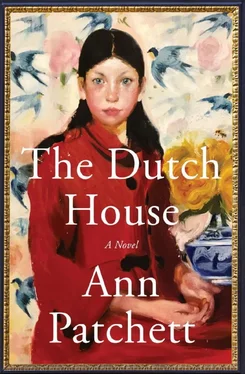All of that changed after Andrea arrived. She made weekly menus for Jocelyn to follow and gave her opinion on every course: there wasn’t enough salt in the soup; she had given the girls too many mashed potatoes. How could they be expected to eat so many mashed potatoes? Why was Jocelyn serving cod when Andrea had specifically told her sole? Could she not have troubled herself to check another market? Did Andrea have to do everything? Every day she worked to find something extra for Sandy to do, dusting the shelves in the pantry or washing the curtain sheers. I no longer heard Sandy and Jocelyn talking to each other in the halls. I no longer heard Jocelyn’s spectacular whistling when she arrived at the house in the morning. They were no longer allowed to call up the stairs to ask a question, they were to walk up and find us like civilized people. That’s what Andrea said. Sandy and Jocelyn made it a point to be less visible, more civilized, to work wherever we were not. Or maybe that was me. I was in my bedroom more after Maeve left.
There were six bedrooms on the second floor of the house: my father’s room, mine, Maeve’s, a sunny room with twin beds where Bright and Norma slept, a room for the guests we never had, and the last room, which had been made into a household office. There was also a sort of sitting area at the top of the stairs where no one had ever sat until Norma and Bright showed up. They seemed to love to sit at the top of the stairs.
Andrea announced her plans for the reconfiguration one night at dinner. “I’m going to move Norma into the room with the window seat,” she said.
My father and I could only look at her while Sandy, who was refilling the water glasses, took a step back from the table.
Andrea noticed nothing. “Norma’s the oldest girl now. That’s the room for the biggest girl.”
Norma’s mouth opened a bit. I could see that all of this was news to her. If she had wanted to be in Maeve’s room it was because she wanted to be with Maeve.
“Maeve’s coming home again,” my father said. “She’s only gone to New York.”
“And when she comes back to visit she’ll have a beautiful room on the third floor. Sandy will see to that, won’t you, Sandy?”
But Sandy didn’t answer. She held the water pitcher to her chest as if to keep herself from throwing it.
“I don’t think we need to do this now,” my father said. “There’s no shortage of places to sleep around here. Norma can have the guest room if she wants it.”
“The guest room is for our guests. Norma will sleep in the room with the window seat. It’s the nicest bedroom in the house, the nicest view. It silly to hold it as a shrine for someone who doesn’t live here. Honestly, I thought that maybe we should take the room ourselves but the closet isn’t very big. Norma has such little dresses. The closet will be fine for you, won’t it?”
Norma nodded slowly, both horrified by her mother and mesmerized by the thought of that window seat, those wonderful drapes that could close a person off from everything.
“I want to sleep in Maeve’s room,” Bright said. Bright hadn’t adjusted to living in so much space and she clung to her sister in the way I had clung to mine.
“You’ll each have your own room, and Norma will let you visit,” her mother said. “Everyone will adjust just fine. It’s like your father said, this house is big enough for everyone to have her own room.”
And with that the matter was closed. I never said a thing. I looked at my father, who was apparently now the father of Norma and Bright as well, hoping he would give it another shot, but he let it go. Andrea was a very pretty woman. He could give her her way now or he could wait and give her her way later, but either way, she was going to get what she wanted.
All of this happened around the time I’d fallen in love with one of the VanHoebeek daughters, or rather with her portrait, which I called Julia. Julia had narrow shoulders and yellow hair held back by a green ribbon. Her portrait hung in a bedroom on the third floor of the Dutch House above a bed no one ever slept in. With the exception of Sandy, who ran the vacuum and wiped things down with a dust rag on Thursdays, no one but me set foot up there. I believed that Julia and I were true lovers thwarted by the misalignment of our births. I worked myself into such a state over the injustice of it all that I once made the error of calling my sister at Barnard to ask if she had ever wondered about the girl whose painting hung in the third-floor bedroom, the girl with the gray-green eyes who was one of the VanHoebeek daughters.
“A daughter?” Maeve said. I was lucky to have caught her on the phone. “They didn’t have any daughters. I think that’s Mrs. VanHoebeek when she was a girl. Take the painting downstairs and look at them together. I think they’re both her.”
My sister was fully capable of teasing me until I could have bled from my ears, but just as often she spoke as if we were equals, giving me an honest answer to any question. I could tell by her voice she wasn’t joking, or even particularly paying attention to what I had asked. I ran up the turning staircase to the third floor and stood on the unused bed to lift the carved gilt frame of my beloved off the wall (the frame was grander than what she would have wanted and not as grand as what she deserved). My Julia was not Mrs. VanHoebeek. But when I carried the painting downstairs to lean it on the mantelpiece, it was clear that Maeve was right. They were paintings of the same woman seated at either end of her life, old Mrs. VanHoebeek with the black silk buttons marching up to her neck and young Julia caught in a breeze. And really, even if it wasn’t the same woman, such a likeness made it clear how one day the daughter would become the mother. Then Jocelyn came around the corner and caught me standing there looking at the two paintings together. She shook her head. “Time flies,” she said.
Sandy and Jocelyn moved Maeve’s things up to the third floor. At least the room faced the back garden like her old room did. At least the view would be more or less the same and arguably even better: fewer branches, more leaves. But the windows were dormers, of course, and there was no window seat. The new room was also a fraction of the size, and under the eaves so the ceiling sloped. As tall as Maeve was she’d be hitting her head every other minute.
The whole depressing enterprise of turning Maeve’s room into Norma’s room took longer than anyone could have imagined, since once Maeve’s things were out Andrea wanted the place painted, and after it was painted she changed her mind and started bringing home books of wallpaper. She shopped for a new bedspread, a new rug. For a couple of weeks the redecoration was all anyone heard about, but it wasn’t until Maeve came home for Thanksgiving that I realized none of us had been brave enough to inform my sister of her exile. Surely that was my father’s job, and surely the rest of us would have known that he would never do it. Maeve was in the foyer, swinging me around, kissing Sandy and Jocelyn, kissing the little girls, and suddenly we all understood that she was about to go upstairs and find a raft of dolls spread across what had been her bed. In that moment it was Andrea, always the general, who showed presence of mind.
“Maeve, we’ve changed some things around since you’ve been gone. You’re on the third floor now. It’s very nice.”
“The attic?” Maeve asked.
“The third floor,” Andrea repeated.
My father picked up her suitcase. He had nothing to say on the subject but at least he was willing to go up there with her. What with his knee that bothered him on stairs, our father never went to the third floor. Maeve still had her red coat on, she was wearing gloves. She laughed. “It’s just like The Little Princess !” she said. “The girl loses all of her money and so they put her in the attic and make her clean the fireplaces.” She turned to Norma. “No big ideas for you, Miss. I will not be cleaning your fireplace.”
Читать дальше





![Энн Пэтчетт - Прощальный фокус [litres]](/books/402782/enn-petchett-prochalnyj-fokus-litres-thumb.webp)






